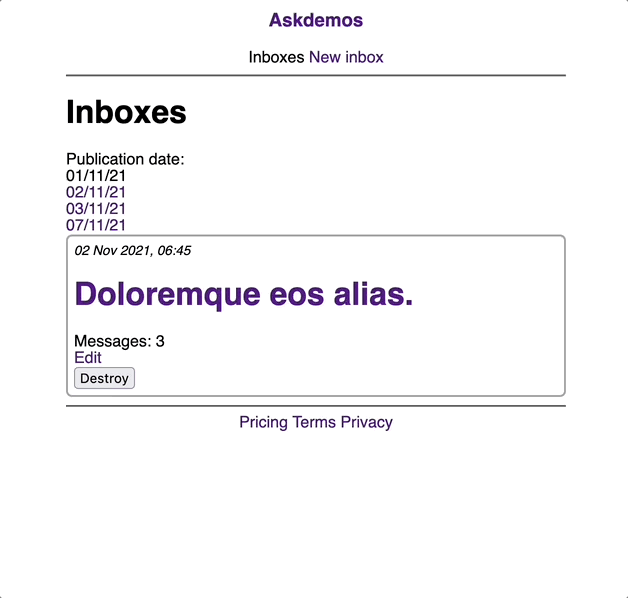 Paginate/Tab records by any attribute
Paginate/Tab records by any attribute
Just think about it: pagination = tabs.
From this point of view, It’s easy to add pagination/tabs by any attribute.
For example, pagination/tabs by date:

1. Paginate/Tab by Date #
rails g scaffold post name category published_at:datetime
rails db:migrate
# config/seeds.rb
5.times do
random_date = Time.at(rand * Time.now.to_i)
random_category = %w[ruby python java].sample
post = Post.create(name: SecureRandom.hex,
category: random_category,
published_at random_date)
end
# app/controllers/posts_controller.rb
def index
@posts = if params[:date].present?
Post.where(published_at: params[:date])
else
Post.where(published_at: Date.today)
end
end
# app/views/posts/index.html.erb
Publication date:
<% Inbox.pluck(:published_at).uniq.sort.each do |i| %>
<br>
<%= link_to_unless_current i.strftime('%d/%m/%y'), inboxes_path(date: i) %>
<% end %>
<br>
<div id="inboxes">
<%= render @inboxes %>
</div>
Paginate/Tab by Category #
# app/controllers/posts_controller.rb
def index
@posts = if params[:category].present?
Post.where(category: params[:category])
else
Post.all
end
end
# app/views/posts/index.html.erb
Categories:
<% Post.all.pluck(:category).uniq.sort.each do |category| %>
<%= link_to_unless_current category, posts_path(category: category) %>
<% end %>
<%= link_to "Clear filters", request.path if request.query_parameters.any? %>
<br>
<div id="inboxes">
<%= render @inboxes %>
</div>
Did you like this article? Did it save you some time?
